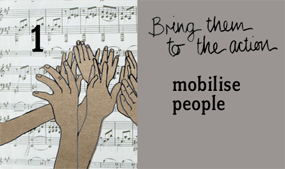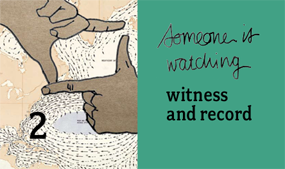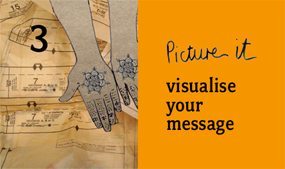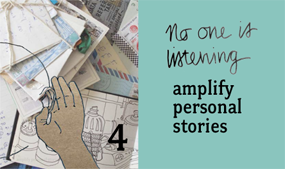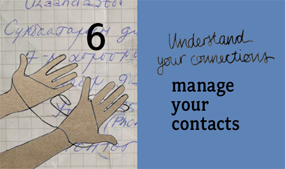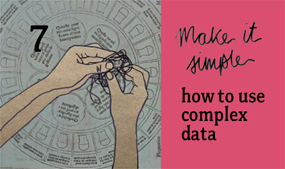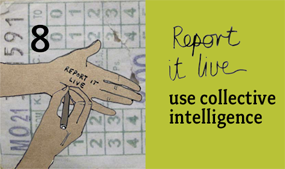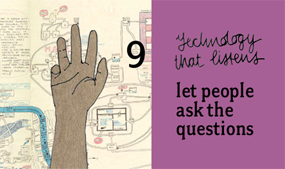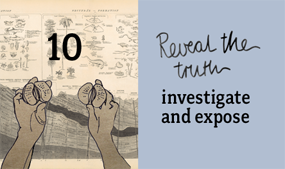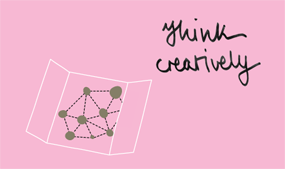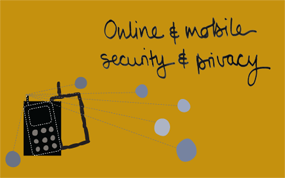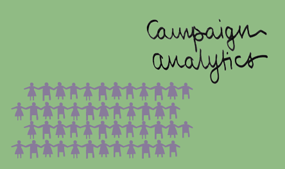Aggregate (as in blog posts): On the web, content is aggregated when numerous pieces of media are
automatically brought together in one place.
Apache: Free, open source web server software, commonly used with web applications.
BarCamp: An international network of conferences organised collaboratively on an open source model, using wikis,
email lists, blogs, and other social media tools.
Blog(s): A website made up of short posts on a unified theme or topic. Most blogs use web-based software that allow people to post new content easily, without reorganising old content or having to know HTML.
Blogathon: A live event where bloggers choose one topic or theme and all blog together. One blogger may host the blogathon, by linking all the separate posts to one blog site.
Blogspot: A free blog hosting website and community owned by Google. blip.tv: A free website allowing users to upload and share videos with others.
Citizen reporter: A member of the public who is not a professional journalist but independently collects, reports and disseminates news and information.
CiviCRM: A free, open source software application for managing contact relationships.
Content Management System (CMS): Software used to organise, update and share content on the internet. Examples include Drupal and Joomla. Blogging software, like Wordpress, can also be used as a CMS.
Crowdsource: A way to delegate a task to a group of people or create collaboration among a group of unconnected people - for example relying on volunteers to subtitle web- based videos with different languages.
DailyMotion: A video hosting and sharing website.
Digital storytelling: Creating a narrative using digital tools and digital media. This method is often used to tell personal stories and might consist of words, pictures, audio, and video.
Domain name: A text-based registered address that corresponds to the location of the different components (web pages, media and files) of a website.
Drupal: A free and open source content management system (CMS). (Also see: CMS.)
Encrypt/encryption: A way to take information and code or scramble it so that only restricted people can decrypt it and access it.
Excel: A spreadsheet software application, owned by Microsoft.
Facebook: A social network site where people can create a profile, add other users as friends and post and share content. People on Facebook are required by the Terms of Service to use their real name.
Facebook Group: Any user can create a group and invite other users to join it. Group administrators can message all the members of a group, so long as there are less than 5000 members.
Facebook News Feed: Each user has access to a News Feed detailing their friends' activity on the website. The user can control what is published in this feed.
Facebook Page: Any user can create a page and invite other users to become a fan of it. Pages can be organised around any common interest and used to send out bulk messages to fans.
Facebook Profile: This is a user's personal page, listing their friends, interests, group memberships, and recent activity on the site. Users can control which parts of their profile are visible to others.
FireGPG: A software application that is installed inside of the web browser, Firefox. FireGPG allows you to encrypt emails from within the web browser.
Flash: An Adobe owned graphic programme for creating animation and multimedia elements of websites. Many video websites publish videos in the Flash file format.
Freedom of Information Act (FOIA) Request: A mechanism for any person to request data from a government body.
Flash mobs: A flash mob is a group of people (often organised through email or a social network site) who gather for a short time in a public space, as if by chance. Once gathered, the group performs a synchronised (and often unusual) action, and then disperses.
Flickr: A photo hosting and sharing website owned by Yahoo. People can upload photos using the website or email, third-party applications, or mobile phones. The standard service is free but there is also a more advanced service at a charge.
FTP (file transfer protocol): The method by which files are sent over the internet. Using a programme on the client computer, files can be uploaded to the host computer - the server that hosts files.
Freedom Fone: A database-driven software application that allows people to access information through voice calls made on land, mobile and internet phones.
FreeSwitch: Free, open source software for creating voice and text chat-based applications.
FrontlineSMS: A free open source software tool that can turn a laptop and a mobile phone into a communications hub. Once installed, the programme enables users to send and receive text messages in bulk.
Google Earth: Software made for viewing 3D maps of the Earth. People can customise map points on Google Earth by including photo, video content and text annotations, which can be saved to share with others.
Google Images: An image search engine. In the advanced search options, you can search for images by the copyright license used as a way to find images that can be re-used and re-mixed.
Google Maps: A database of maps and mapping software. People can use this data to customise and annotate maps, and to combine maps with other applications and media, such as placing photos on a map or embedding a custom map on your website.
Google Motion Chart: A web application that generates a dynamic chart as a Flash file, illustrating data imported from a Google Spreadsheet. Works best to represent how two kinds of data change over time.
Google News: An aggregated news search directory, indexed by Google. People can sign up to have Google News Alerts sent to them automatically by email when certain subjects or keywords appear in news stories. You can also have these updates sent to feed readers, or have these updates appear directly and automatically on your website.
Google Spreadsheet: A free, web-based application for generating, editing, and sharing spreadsheets, stored on the web.
Gmail: A free, web-based email service owned by Google.
GPG: Gnu Privacy Guard (GPG) is an open source version of PGP (Pretty Good Privacy), a kind of data encryption software that codes your data and makes it available for decrypting only to people who have your access key.
Hard drive: A permanent storage device for a computer's data. There are two kinds of hard drives, internal (installed inside a computer) and external (connected to the computer by a cable). External hard drives can be moved from one computer to another. The data on a hard drive can also be encrypted.
HTML: Hypertext Markup Language. HTML is the computing language used to communicate the content and layout of a webpage when it is loaded from a web server to a web browser.
ICQ: An internet-based instant messaging or chat programme (owned by AOL/Time Warner) that allows people to exchange messages between computers.
Infographic: A way to visualise and give meaning to data using pictures, maps, diagrams, graphs, or other graphic elements.
IntelliSMS: A commercial software application for sending and receiving text messages.
Interactive voice response (IVR): A technology that allows a computer to identify words spoken by a human voice in order to respond with pre-set or dynamic information.
IP address: The unique numerical identifier assigned to each device communicating via the internet. When transmitting data on the internet, the I P address of the computer or other device you are connecting to the internet with becomes associated with the data you transmit.
javaScript: A scripting language used in web pages to display and format content or to run actions -like pop- up windows, or images which appear when a cursor moves over them.
joomLa: A free, open source, web-based content management system (CMS). (See also: CMS.)
Livejournal: A blogging website (owned by SU P) which hosts personal journals and community journals (where
numerous people may post content). The software running LiveJournal is open source and may be used under that license by anyone to run a blogging community.
Livestream.com: A free software application for sharing live video from your phone or computer connected to the internet.
Mash-up: A combination of different tools, media, or software to create a hybrid media. A mash-up web application may combine two different web services, while a video mash-up mixes different videos and other media together into one new video.
MMS (multimedia message): A format for sending media messages between mobile phones. Using MMS, you can send photos, audio, videos, and text messages that exceed the usual 160 character limit on text (SMS) messages.
MySpace: A social network site (owned by Fox Interactive Media/NewsCorp) where users can create a profile, add other MySpace users as friends and post and share content.
MySQL: A database management application. MySQL's code is owned by Sun Microsystems but is licensed for free distribution.
Network map: A visual representation of people, organisations, or institutions and their relationships to one another.
Open source software: Computer software in which the programming code is free for people to view, modify, and build new software from, with the agreement that in keeping the code open, more people can benefit from a community of programmers' collaborative work.
Orkut: A free social network site (owned by Google) which has a significant user-base in Brazil and India.
PHP: A free scripting language for web applications.
Qik: A free software application for sharing live video from your phone.
Remixed: The process of mixing two or more kinds of media together. People most often remix videos and audio, and combinations of both.
Ringtone: A digital audio file that plays when a mobile phone receives a call or text message. Ringtones can be shared between mobile phones and custom versions can be created using free software programmes.
SMS: See 'text message'
Short codes: Sometimes called a short number, this is a special telephone number used to address text (SMS)
messages or MMS messages.
SIM card: A SIM (subscribed identity module) card stores the unique and identifying information of a mobile phone user - such as their contacts, data and their personal information.
Server: A computer that provides data requested by numerous other computers connected in a network.
Social network sites: Websites where people can create a profile, make connections with other users and communicate and share content together. Examples include MySpace, Facebook, bebo, Orkut, and HiS.
SquirrelMail: A free, open source web- based email application. SquirrelMail is not hosted by a commercial service; it must be installed on a server of your own.
Tagging: A tag is a text label used to identify pieces of content on one or across many websites. Many social network sites and photo and video sharing sites use tagging to allow one piece of content to be filed in multiple categories.
Tag cloud: A way to visualise information about a dense or lengthy text, usually in a cluster of words or phrases, stylised to indicate which appear most often.
Text message: Also known as a SMS, this is sent between mobile phones and is limited to 160 or fewer characters.
Twitter: A web-based service for sharing short text (140 characters or less) posts. People can post on the Twitter website or via a text message.
USB memory sticks: A portable storage device for data that plugs into a computer's USB port.
Ushahidi: Software application that allows people to share timely updates by sending messages using mobile phones, email, or via a website. These messages are aggregated, indexed and visualised on a website.
Ustream.tv: A free software application for sharing live video from your phone or computer connected to the internet.
Visualisations: A way to represent and simplify complex data using graphics.
WampServer: Refers to an installation of Apache, MySQL, and PHP on a Windows server.
Web 2.0: A concept that is used to refer to a new generation of internet use that allows users to more easily create and share content and network with one another.
Web browser: A software application used to view web pages. Examples of open source web browsers include Firefox and Konqueror.
Web-scrapers: An application set to automatically extract information from web pages.
Wiki: A website that any user can edit. Multiple contributors can contribute to a wiki together, with their revisions tracked and different versions saved.
Wikipedia: A website modelled on an encyclopedia, where anybody can write their own contributions, or edit the contributions of others.
Word press: Free and open source software for publishing and managing a blog. You can download and install Wordpress on your own server or Wordpress can host your blog for free at Wordpress.com.
Xapian: A free, open source information retrieval and search application which is used with database applications.
Yahoo Mail: A free, web-based email service, owned by Yahoo.
YouTube: A free video hosting and sharing website owned by Google. People can upload a video from a computer, by email, or from a mobile phone.


